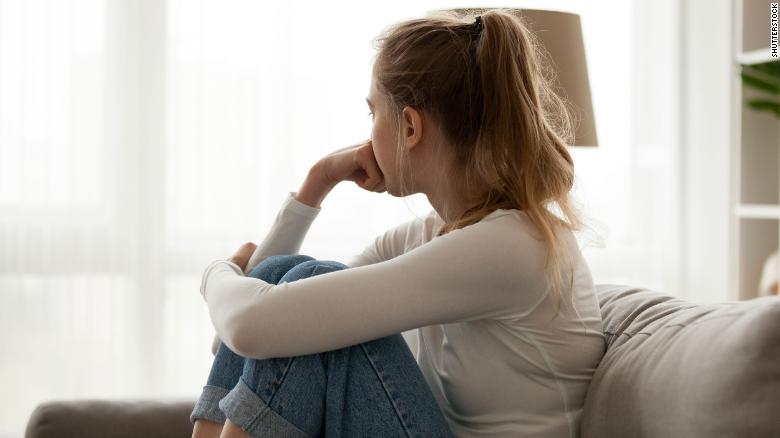Dying from covid-19: alone and without a funeral 4:55
(CNN) -
As many people are faced with the prospect of being alone during the holiday season, a study has shown how loneliness could help build structures in the brain tied to imagination.
According to a study published Tuesday in the journal Nature Communications, lonely people are more likely to be more active in areas of the brain linked to remembering, thinking about others and planning for the future.
The researchers had hypothesized that the so-called default network in the brain, which is involved with memory and social cognition, would likely undergo changes related to loneliness.
"What surprised us is that it was overwhelmingly the largest effect in the data," said lead study author Nathan Spreng, associate professor of neurology at McGill University in Montreal.
Amid an epidemic of loneliness, some friendships grow stronger
advertising
The ties between these areas had been strengthened and the volume of gray matter there was greater than in those who were not alone.
The results converged on the default network as the most affected by perceived isolation and loneliness.
Study on loneliness with a large amount of data
Long before the pandemic, loneliness was increasingly seen as a public health issue, enough for the UK to appoint a Minister for Loneliness in 2018.
Data has shown that lonely adults are about 1.64 times more likely to develop dementia compared to those who do not report loneliness, according to a 2015 review of worldwide studies.
Results like these prompted the researchers to examine brain images of 40,000 subjects, all drawn from the UK Biobank, a large-scale database that stores biomedical information on some 500,000 Britons.
Participants in that study, who were between the ages of 40 and 69, completed assessments that included questions asking whether or not they felt lonely.
The researchers then compared MRI images of self-identified lonely people with those who did not feel lonely on a regular basis.
The data sample size is a rarity in this area of science, Spreng said, and it was the result of the biobank dramatically expanding its available brain images last February.
"We started working on it immediately when they came out and it was very exciting," said Spreng.
Will you spend only the end of the year festivities?
See here some tips on how to find joy in solitude
Use of online payments grows due to the pandemic and 1:31 holidays
Before this, most of his work in neuroscience had focused on cohorts with only hundreds of participants, a significant number in and of itself.
But now, with tens of thousands of subject data to extract, there was much more to learn.
The researchers' hypothesis that the default network in the brain was active during loneliness was logical, because those are parties involved in thinking about oneself, according to Dr. Kenneth Heilman, professor emeritus in the Department of Neurology at the University of California. Florida, whose books include
Creativity and the Brain and The Believer's Brain
.
Heilman was not involved in the McGill study.
There is an old saying in neurology that we always use.
And that's 'use it or lose it,' "Heilman said.
Although the parts of the brain primed for creativity and thinking about oneself may grow during loneliness, that could mean that other social parts of the brain would atrophy from inactivity.
"The big question arises, are other parts of the brain that are important for interactions starting to be lost?" Heilman asked.
"If you don't use them eventually, will that lead to a more insane kind of disorder?"
Talking robots, allies against loneliness in the elderly 1:07
Information about Alzheimer's
A key way this study could benefit medicine more broadly is by helping scientists better understand how social isolation, an even more crucial issue during a pandemic, could change the structure of the brain, putting people at risk for Alzheimer's as they age.
"There are still many other factors that need to be examined, such as how loneliness interacts with the APOE-4 genotype," said Spreng.
That gene has been linked to up to 25% of Alzheimer's cases, according to the Alzheimer's Association.
And because older people at risk for dementia are often more isolated when they live alone or in shared housing, further research could reveal how loneliness could exacerbate an already present genetic predisposition.
"This first study was really important in terms of identifying which parts of the brain are affected by loneliness," he said.
“We are using that information and we are following a large sample of older adults.
We are seeing how your brain ages over several years and how your experience of loneliness could accelerate the atrophy patterns.
And the study is more important after a pandemic year in which social isolation is more common.
"Feeling socially connected is extremely important," said Spreng.
“Coming out of covid-19-related isolation will likely be much easier for some people, particularly young adults.
Older adults may need more help.
Loneliness




/cloudfront-eu-central-1.images.arcpublishing.com/prisa/SA262KRCZ5BVRO4P7SUSVQPR7Q.jpg)

/cloudfront-eu-central-1.images.arcpublishing.com/prisa/C4BOJCQJZFGPJORE3TOF2IPXME.jpg)
/cloudfront-eu-central-1.images.arcpublishing.com/prisa/YXV2XXPRIRGLBCZD37DUIOI5MY.jpg)






